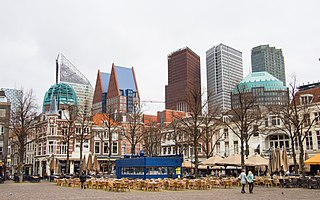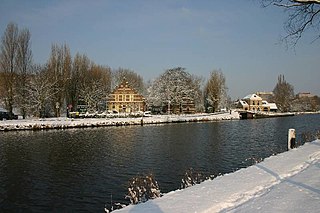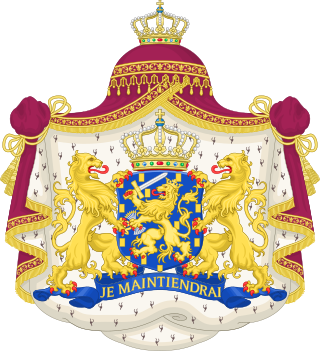
A barrister is a type of lawyer in common law jurisdictions. Barristers mostly specialise in courtroom advocacy and litigation. Their tasks include arguing cases in courts and tribunals, drafting legal pleadings, researching the law and giving legal opinions.

The Hague is the capital city of the South Holland province of the Netherlands. With a population of over half a million, it is the third-largest city in the Netherlands. Situated on the west coast facing the North Sea, The Hague is the country's administrative centre and its seat of government, and while the official capital of the Netherlands is Amsterdam, The Hague has been described as the country's de facto capital since the time of the Dutch Republic.
A solicitor is a legal practitioner who traditionally deals with most of the legal matters in some jurisdictions. A person must have legally-defined qualifications, which vary from one jurisdiction to another, to be described as a solicitor and enabled to practise there as such. For example, in England and Wales a solicitor is admitted to practise under the provisions of the Solicitors Act 1974. With some exceptions, practising solicitors must possess a practising certificate. There are many more solicitors than barristers in England; they undertake the general aspects of giving legal advice and conducting legal proceedings.

Rijswijk, formerly known as Ryswick in English, is a town and municipality in the western Netherlands, in the province of South Holland. Its population was 59.642 in 2024, and it has an area of 14.49 km2 (5.59 sq mi), 0.53 km2 (0.20 sq mi) of which is water.

Since 1 January 2023, there have been 342 regular municipalities and three special municipalities in the Netherlands. The latter is the status of three of the six island territories that make up the Dutch Caribbean. Municipalities are the second-level administrative division, or public bodies, in the Netherlands and are subdivisions of their respective provinces. Their duties are delegated to them by the central government and they are ruled by a municipal council that is elected every four years. Municipal mergers have reduced the total number of municipalities by two-thirds since the first official boundaries were created in the mid 19th century. Municipalities themselves are informally subdivided into districts and neighbourhoods for administrative and statistical purposes.

The European Patent Office (EPO) is one of the two organs of the European Patent Organisation (EPOrg), the other being the Administrative Council. The EPO acts as executive body for the organisation while the Administrative Council acts as its supervisory body as well as, to a limited extent, its legislative body. The actual legislative power to revise the European Patent Convention lies with the Contracting States themselves when meeting at a Conference of the Contracting States.
A trademark attorney or trade mark attorney or agent is a person who is qualified to act in matters involving trademark law and practice and provide legal advice on trade mark and design matters.

Johannes Bob van Benthem was a Dutch lawyer. He was the first president of the European Patent Office (EPO), from 1977 to 1985.

Hendrik Pieter Nicolaas Muller was a Dutch entrepreneur, diplomat, and publicist who started his career as a businessman, trading with East and West Africa. In his mid-twenties he travelled to Zanzibar, Mozambique, and South Africa for business purposes, but showed himself a keen ethnographer as well.
The Netherlands Patent Office is the patent office of the Netherlands. It is an agency of the Dutch Ministry of Economic Affairs. The agency is located in the premises of the European Patent Office (EPO), in Rijswijk, near The Hague. The Netherlands Patent Office grants patents in the Netherlands and deals with European patents validated in the Netherlands. It assumes its functions from the rijksoctrooiwet.

The Kingdom of the Netherlands, commonly known simply as the Netherlands, is a sovereign state consisting of a collection of constituent territories united under the monarch of the Netherlands, who functions as head of state. The realm is not a federation; it is a unitary monarchy with its largest subdivision, the eponymous Netherlands, predominantly located in Northwestern Europe and with several smaller island territories located in the Caribbean.

The monarchy of the Netherlands is governed by the country's constitution, roughly a third of which explains the mechanics of succession, accession, and abdication; the roles and duties of the monarch; the formalities of communication between the States General of the Netherlands; and the monarch's role in creating laws.

Winnifred "Winnie" Sorgdrager is a retired Dutch politician of the Democrats 66 (D66) party and jurist. She was granted the honorary title of Minister of State on 22 June 2018.

The Grutte Mûne is a smock mill in Broeksterwâld, Friesland, Netherlands which has been restored to working order. The mill is listed as a Rijksmonument, number 11679.

De Hantumermolen is a smock mill in Hantum, Friesland, Netherlands which was built in 1880. The mill has been restored to working order. It is listed as a Rijksmonument, number 38619.

Indonesia and the Netherlands share a special relationship, embedded in their shared history of colonial interactions for centuries. It began during the spice trade as the Netherlands established the Dutch East Indies Company (VOC) trading post in what is now Indonesia, before colonising it as the Dutch East Indies until the mid-20th century. Indonesia was the largest former Dutch colony. In the early 21st century, the Dutch government has committed to boosting its relationship with Indonesia, noting that economic, political, and interpersonal contacts should be further strengthened.
Anthony van der Eb was a Dutch civil servant, who made a career in the administration on the Dutch Gold Coast.
Patent law in the Netherlands, or simply Dutch patent law, is mainly governed by the Kingdom Patents Act and the European Patent Convention. A patent covering the Netherlands can be obtained through three different routes: through the direct filing of a national patent application with the Netherlands Patent Office, through the filing of a European patent application, or through the filing of an international application under the Patent Cooperation Treaty followed by the entry into European phase of said international application. The Dutch patent has a term of 20 years and has effect in the Netherlands, Curaçao and Sint Maarten. Aruba has its own patent system.

Solicitor General for New South Wales, known informally as the Solicitor General, is one of the Law Officers of the Crown, and the deputy of the Attorney General. They can exercise the powers of the Attorney General in the Attorney General's absence. The Solicitor General acts alongside the Crown Advocate, and Crown Solicitor, and serves as one of the legal and constitutional advisers of the Crown and its government in the Australian state of New South Wales.
Peter v. NantKwest Inc., 589 U.S. ___ (2019), was a United States Supreme Court case from the October 2019 term.

















